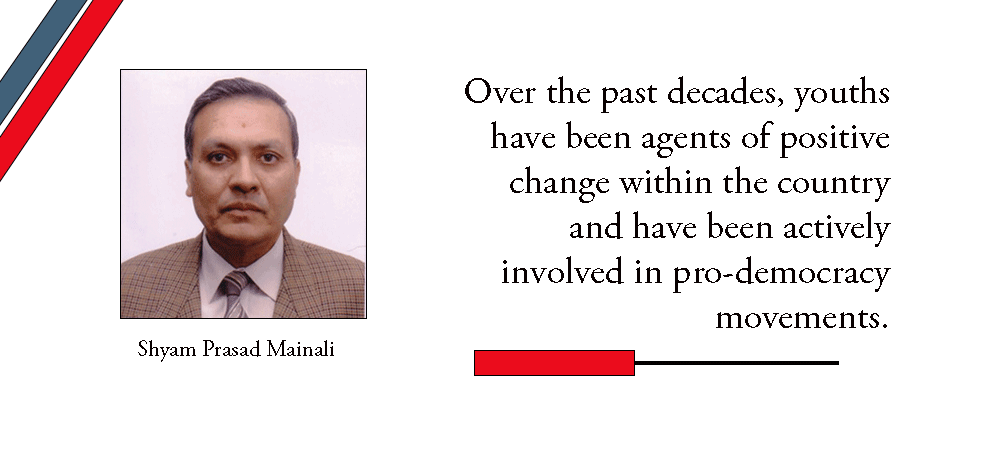- Friday, 20 February 2026
Youths Emerge As Change Agents
Politics needs to be inclusive of all segments of society. Inclusive participation should be an aspiration for all democracies and is crucial for building stable and peaceful societies. If youths are disenfranchised in politics, a significant proportion of the population will have no influence on decision-making and policy formulation. Their novel outlook, passion, and energy have the potential to contribute to the development of a nation.
In general, youths have played important roles in political movements by participating in protests and leading revolutions. Despite such significant contributions, youths often find themselves ostracised from mainstream politics by old nonperformers. This has leads to frustration, which often manifests in the form of conflict and destabilisation. Youths are encouraged to participate in and contribute to politics everywhere. Steps need to be taken to attract them into politics.
Sustainable policies
A report published by the Organisation for Economic Cooperation and Development (OECD) explains that 53 per cent of its members have active youth participation, which has resulted in more democratic and sustainable policies. The roles of these youths and their potential to be harbingers of change have directed nations in a new and positive direction.
However, youth representation as elected officials is still low. A Parliamentary Union report from 2021 clearly reveals that less than three per cent of the world’s lawmakers are below the age of 30. Twenty-five per cent of the single or lower houses have representation of members below the age of 30, and 73 per cent of the upper houses have no representation of groups below this age.
It is also pertinent to point out that most of this youth representation is also limited to men. Armenia, Ukraine, and Turkmenistan are fitting examples of youth representation in parliament, as more than 60 per cent of the members of parliament (MPs) here are under the age of 45. Likewise, 10 per cent of the MPs in Norway, Armenia, San Marino, Gambia, and Belgium are below the age of thirty. Governments also incentivise youth participation in politics, such as in Lebanon, where they offer an internship for graduates to understand public policy and law-making procedures in the country. Several nations also have extensive youth parliaments, most notably the United Kingdom (UK).
Nepal has a very young population with a median age of around 25. Over the past decades, youths have been agents of positive change within the country and have been actively involved in pro-democracy movements. However, the gerontocratic nature of Nepali politics has meant that youths have not been occupying the political spaces they deserve.
The lack of opportunities for participation in politics has led to a dearth of opportunities within society. The absence of employment and education openings, along with low salaries and political instability, has led to a brain drain as talented youths look abroad to improve their situations.
Mainstream political leaders are not willing to handover meaningful decision-making positions to the younger generation, leading to a political elite class of those over the age of sixty. These leaders are not in favour of supporting young leaders unless they need their token support. Constitutional and legal provisions are tricky and not conducive to attracting youth.
Youths are prevented from contesting elections as an individual must be at least 25 years old to contest federal and provincial elections. A person should also be at least 45 years to be part of a constitutional body. Youths in Nepal are designated as those of ages between 16 and 40, but in most places, they are designated as being under the age of 30. Bureaucratic and legal provisions in the country are not conducive to youth political participation.
In Nepal, there is only 5 per cent representation of youths in parliament as against 13.5 per cent global average. To participate in mainstream politics, an individual needs to be a dedicated follower of the party and leadership, involved in political campaigns, jailed for political demonstrations, and more. However, the most surefire way to achieve representation is to be close to the old leaders of their party and follow their instructions, which undermines youth representation.
Recent elections in Nepal have shown a rise in the number of young candidates. Mayor of Kathmandu Balendra Shah, and Mayor of Dharan Sub-metropolis Harka Sampang Rai are two notable examples. These leaders and many more are the beneficiaries of an increasingly frustrated electorate of youth who find their issues unaddressed by gerontocratic leaders.
Ambitious changes
Shah and Rai have promised ambitious changes for youths in Nepal, but this will be difficult to achieve. As independent leaders, it will be difficult to for them to radically change the status quo, especially with the lack of youth in parliament, and the dominance of mainstream parties.
To improve the situation for Nepali youths, these candidates must continue their quest for good governance by effectively opposing those who have failed to deliver on their promises. They must also not get engaged in the political games and corruption that previous regimes had been involved to maintain their integrity. This will ensure civic trust in these leaders and is likely to lead to a further increase in representation in the future elections. Only with more honest and passionate young candidates will bring about real change for youths in the country.
(Mainali is the former secretary of the government of Nepal.)















